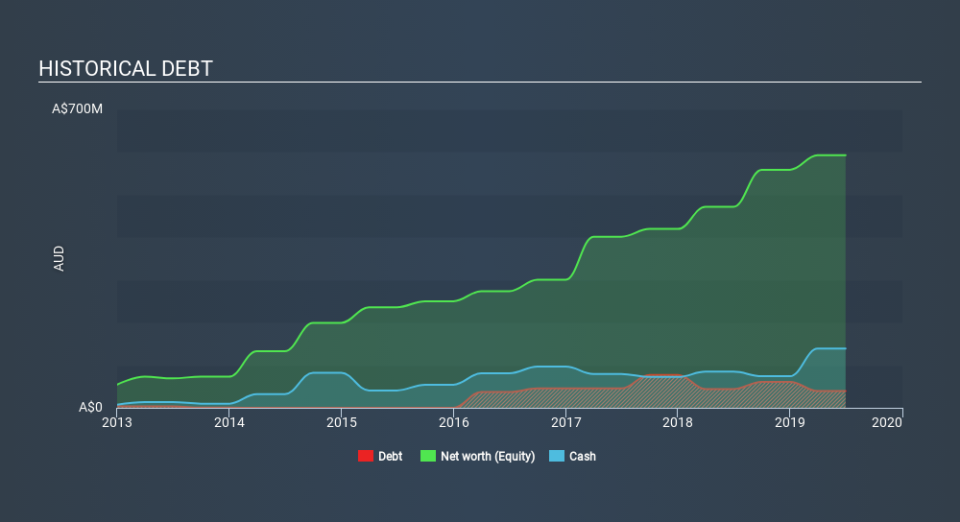Does Corporate Travel Management (ASX:CTD) Have A Healthy Balance Sheet?

The external fund manager backed by Berkshire Hathaway's Charlie Munger, Li Lu, makes no bones about it when he says 'The biggest investment risk is not the volatility of prices, but whether you will suffer a permanent loss of capital. When we think about how risky a company is, we always like to look at its use of debt, since debt overload can lead to ruin. We note that Corporate Travel Management Limited (ASX:CTD) does have debt on its balance sheet. But the more important question is: how much risk is that debt creating?
Why Does Debt Bring Risk?
Debt and other liabilities become risky for a business when it cannot easily fulfill those obligations, either with free cash flow or by raising capital at an attractive price. Ultimately, if the company can't fulfill its legal obligations to repay debt, shareholders could walk away with nothing. While that is not too common, we often do see indebted companies permanently diluting shareholders because lenders force them to raise capital at a distressed price. By replacing dilution, though, debt can be an extremely good tool for businesses that need capital to invest in growth at high rates of return. When we think about a company's use of debt, we first look at cash and debt together.
See our latest analysis for Corporate Travel Management
What Is Corporate Travel Management's Debt?
You can click the graphic below for the historical numbers, but it shows that as of June 2019 Corporate Travel Management had AU$39.3m of debt, an increase on AU$44.0, over one year. But on the other hand it also has AU$138.8m in cash, leading to a AU$99.5m net cash position.
How Healthy Is Corporate Travel Management's Balance Sheet?
We can see from the most recent balance sheet that Corporate Travel Management had liabilities of AU$367.8m falling due within a year, and liabilities of AU$43.5m due beyond that. Offsetting this, it had AU$138.8m in cash and AU$312.2m in receivables that were due within 12 months. So it can boast AU$39.6m more liquid assets than total liabilities.
Having regard to Corporate Travel Management's size, it seems that its liquid assets are well balanced with its total liabilities. So it's very unlikely that the AU$2.30b company is short on cash, but still worth keeping an eye on the balance sheet. Simply put, the fact that Corporate Travel Management has more cash than debt is arguably a good indication that it can manage its debt safely.
Also good is that Corporate Travel Management grew its EBIT at 16% over the last year, further increasing its ability to manage debt. There's no doubt that we learn most about debt from the balance sheet. But it is future earnings, more than anything, that will determine Corporate Travel Management's ability to maintain a healthy balance sheet going forward. So if you're focused on the future you can check out this free report showing analyst profit forecasts.
Finally, a company can only pay off debt with cold hard cash, not accounting profits. Corporate Travel Management may have net cash on the balance sheet, but it is still interesting to look at how well the business converts its earnings before interest and tax (EBIT) to free cash flow, because that will influence both its need for, and its capacity to manage debt. Over the most recent three years, Corporate Travel Management recorded free cash flow worth 78% of its EBIT, which is around normal, given free cash flow excludes interest and tax. This cold hard cash means it can reduce its debt when it wants to.
Summing up
While we empathize with investors who find debt concerning, you should keep in mind that Corporate Travel Management has net cash of AU$99.5m, as well as more liquid assets than liabilities. The cherry on top was that in converted 78% of that EBIT to free cash flow, bringing in AU$107m. So we don't think Corporate Travel Management's use of debt is risky. Another factor that would give us confidence in Corporate Travel Management would be if insiders have been buying shares: if you're conscious of that signal too, you can find out instantly by clicking this link.
At the end of the day, it's often better to focus on companies that are free from net debt. You can access our special list of such companies (all with a track record of profit growth). It's free.
If you spot an error that warrants correction, please contact the editor at editorial-team@simplywallst.com. This article by Simply Wall St is general in nature. It does not constitute a recommendation to buy or sell any stock, and does not take account of your objectives, or your financial situation. Simply Wall St has no position in the stocks mentioned.
We aim to bring you long-term focused research analysis driven by fundamental data. Note that our analysis may not factor in the latest price-sensitive company announcements or qualitative material. Thank you for reading.

 Yahoo Finance
Yahoo Finance 
